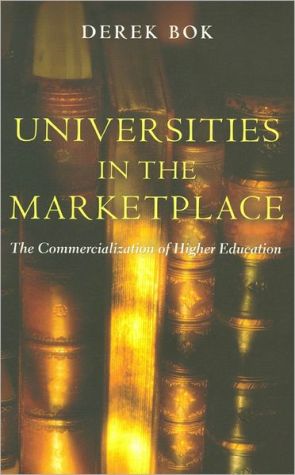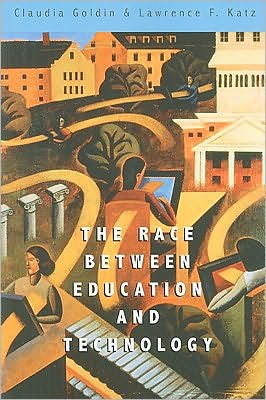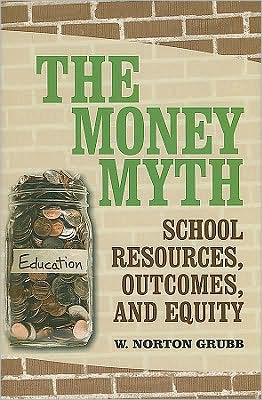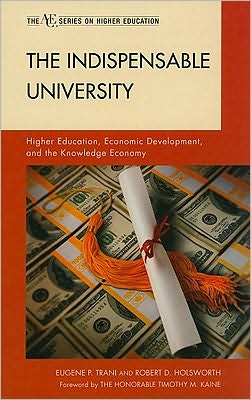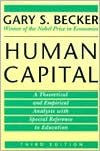Universities in the Marketplace: The Commercialization of Higher Education
Is everything in a university for sale if the price is right? In this book, one of America's leading educators cautions that the answer is all too often "yes." Taking the first comprehensive look at the growing commercialization of our academic institutions, Derek Bok probes the efforts on campus to profit financially not only from athletics but increasingly, from education and research as well. He shows how such ventures are undermining core academic values and what universities can do to...
Search in google:
"Derek Bok grasps better than anyone I know the changes that have taken place in the academic culture of American higher education. In Universities in the Marketplace, he documents the sheer growth of market forces and the escalation of commercialization in academia. Perhaps more important he alerts us that the reach of commercialization has moved from the innocent fringe of the campus (athletics and sweatshirts) to its academic heart. University presidents, trustees, and faculty leaders: take note! This is an important book."--Stanley O. Ikenberry, Regent Professor and President Emeritus, University of Illinois"Derek Bok's wise and judicious book offers a road map for all concerned with the health and integrity of higher education in an age that has seen the boundaries between the academic, corporate, and public worlds become more permeable and the need to understand the costs associated with that transition more urgent. At the same time, President Bok's analysis of the potential dangers lurking in contemporary tendencies toward 'commercialization' is an affirmation that the enduring values of the academy can be extended and strengthened through thoughtful and careful engagement with the questions at issue."--Hanna Holborn Gray, President Emeritus, University of Chicago"Combining the experience of a seasoned university president with the analysis of a respected legal scholar, Derek Bok explores what he concludes are 'signs of excessive commercialization in every part of the university.' His somber assessment of the current state of athletics, scientific research, and distance education, and his call for review and restraint, should engage the attention of every faculty senate in the country. He has given us a timely, candid, courageous, and important book."--Frank H. T. Rhodes, President Emeritus, Cornell University"This book is a thoughtful and wide-ranging analysis of the commercial pressures on universities. There is no other study like it. Extremely well organized, clear, and gracefully written, Universities in the Marketplace will be of interest to all those concerned about higher education and its future."--William G. Bowen, President, The Andrew W. Mellon Foundation"Universities in the Marketplace is quite a successful book that breaks valuable new ground. Derek Bok's calmly reasoned voice contrasts favorably with the hyperbole that surrounds many such discussions. The writing is so clear and the arguments so reasonable that it is easy to overlook the author's effortless command of the relevant literature and his well-judged historical treatment of his subjects. No other book is both so comprehensive and so accessible."--Michael McPherson, President, Macalaster College The Los Angeles Times Bok is one of the premier elder statesmen of American higher education and still a very active member of the professoriate. For his newest book he dons the robes of Jeremiah and denounces universities for their increasing commercialization, illustrated by compromises in research standards for the benefit of wealthy corporations and compromises in admissions standards for the benefit of star athletes. — Steven B. Sample and Warren Bennis
Universities in the Marketplace\ The Commercialization of Higher Education \ \ By Derek Bok \ Princeton University Press\ Copyright © 2003 Derek Bok\ All right reserved.\ ISBN: 0691114129 \ \ \ \ Chapter One\ THE ROOTS OF COMMERCIALIZATION\ \ It is one of the unwritten, and commonly unspoken commonplaces lying at the root\ of modern academic policy that the various universities are competitors for the\ traffic of merchantable instruction in much the same fashion as rival\ establishments in the retail trade compete for custom.-Thorstein Veblen,\ The Higher Learning in America: A Memorandum on the Conduct of Universities\ by Businessmen (1918)\ Toward the end of the twentieth century, American universities-with their stately buildings, tree-lined quadrangles, and slightly disheveled, often-preoccupied professors-found themselves in an enviable position. No longer quiet enclaves removed from the busy world, they had emerged as the nation's chief source for the three ingredients most essential to continued growth and prosperity: highly trained specialists, expert knowledge, and scientific advances others could transform into valuable new products or life-saving treatments and cures.\ This newfound importance brought growing interest from the media, increased funding from government agencies and foundations, and closer scrutiny from public officials. It also brought abundant new opportunities to make money. Universities learned that they could sell the right to use their scientific discoveries to industry and find corporations willing to pay a tidy sum to sponsor courses delivered by Internet or cable television. Apparel firms offered money to have colleges place the corporate logo on their athletic uniforms or, conversely, to put the university's name on caps and sweatshirts sold to the public. Faculty members began to bear such titles as Yahoo Professor of Computer Science or K-Mart Professor of Marketing. The University of Tennessee, in a coup of sorts, reportedly sold its school color to a paint company hoping to find customers wishing to share in the magic of the college's football team by daubing their homes with "Tennessee Orange." One enterprising university even succeeded in finding advertisers willing to pay for the right to place their signs above the urinals in its men's rooms.\ Commercial practices may have become more obvious, but they are hardly a new phenomenon in American higher education. By the early 1900s, the University of Chicago was already advertising regularly to attract students, and the University of Pennsylvania had established a "Bureau of Publicity" to increase its visibility. In 1905, Harvard was concerned enough about its profitable football team to hire a 26-year-old coach at a salary equal to that of its president and twice the amount paid to its full professors. As President Andrew Draper of the University of Illinois observed, the university "is a business concern as well as a moral and intellectual instrumentality, and if business methods are not applied to its management, it will break down."\ What is new about today's commercial practices is not their existence but their unprecedented size and scope. Before 1970, university presidents may have sounded like hucksters on occasion and resorted at times to advertising and other methods borrowed from the world of business. Nevertheless, commercialization in the strict sense of the term-that is, efforts to sell the work of universities for a profit-was largely confined to the periphery of campus life: to athletic programs and, in a few institutions, to correspondence schools and extension programs. Today, opportunities to make money from intellectual work are pursued throughout the university by professors of computer science, biochemistry, corporate finance, and numerous other departments. Entrepreneurship is no longer the exclusive province of athletics departments and development offices; it has taken hold in science faculties, business schools, continuing education divisions, and other academic units across the campus.\ What accounts for the growth of commercial activity in institutions dedicated to higher learning? To Veblen, the obvious culprits were university presidents and their entourage of bureaucratic helpers. Intent upon accumulating money to expand the size and reputation of the institution, campus administrators were forever forcing the methods of the marketplace on a reluctant community of scholars. In Veblen's view, the remedy for the disease was as obvious as its cause: "The academic executive and all his works are an anathema and should be discontinued by the simple expedient of wiping him off the slate."\ If Veblen harbored any doubts about the reasons for commercialization, he did not acknowledge them. Even in his day, however, it should have been plain that the roots of the problem went beyond the academic bureaucracy. More than a few university presidents protested the growth of football programs, only to be overcome by the tidal force of enthusiastic students and alumni. Today, it is even more apparent that the recent surge in money-making activity on campus stems from causes far deeper than policies emanating from the president. University officials have surely initiated entrepreneurial ventures. But they often have little or nothing to do with the efforts of prominent professors to found their own companies, sell their services as teachers to corporations, or allow private companies to market their lectures through the Internet, tape, or videocassette. Nor is there any doubt that the greatest obstacles to reforming intercollegiate athletics continue to lie, not in the president's office, but among the alumni supporters, boosters, legislators, and others who insist on fielding winning teams.\ If Veblen was wrong in heaping so much blame on university presidents, what else helps account for the recent burst of commercial activity on campus? Part of the explanation lies in the growing influence of the market throughout our society. Commercialization has plainly taken root, not only in higher education, but also in many other areas of American life and culture: health care, museums, public schools, even religion. Entrepreneurial initiative, high executive salaries, and aggressive marketing techniques are all spreading to fields of endeavor quite outside the realm of business. Such practices set examples that legitimate the use of similar methods in universities. Nevertheless, merely noting the existence of a trend does not explain why it came about, let alone account for its sudden and deep penetration into an academic culture long considered an "ivory tower" set apart from the marketplace.\ Several scholars have attributed the recent growth of money-making activity to a lack of purpose in the university. Having lost sight of any clear mission beyond a vague commitment to "excellence," our sprawling multiversities are charged with creating a vacuum into which material pursuits have rushed in unimpeded. Explanations of this kind almost invariably come from philosophers, literary scholars, and other humanists. Although they talk expansively about the university, their background is chiefly in the humanities. Since these are the fields of study most widely accused of having lost their intellectual moorings, it is not surprising that their professors see a similar aimlessness as the cause of other ills that have overtaken the academy.\ If one looks more broadly at the university, however, one quickly finds that many faculties and departments are quite clear about their purposes and that these are the very parts of the institution in which commercialization is most rampant. Within the traditional disciplines, no faculty members feel a stronger sense of mission than the scientists, yet it is there-not in the humanities-that commercialization has taken hold most firmly. Among the several faculties, none has a clearer sense of purpose than schools of business and medicine, yet it is their professors-not their colleagues in literature and philosophy-who are most deeply involved in lucrative consulting and entrepreneurial activity.\ If there is an intellectual confusion in the academy that encourages commercialization, it is a confusion over means rather than ends. To keep profit-seeking within reasonable bounds, a university must have a clear sense of the values needed to pursue its goals with a high degree of quality and integrity. When the values become blurred and begin to lose their hold, the urge to make money quickly spreads throughout the institution. Just what these values are and how they are threatened by commercial pursuits are subjects discussed in subsequent chapters. For the moment, it is enough to say that loss of purpose is not a useful explanation for the recent growth of money-making ventures in the university.\ Critics from the left have a different theory to explain the burgeoning commercial activity on campus. To them, such behavior is simply another illustration of the attempts by the businessmen and lawyers who sit on boards of trustees to "commodify" education and research, reduce the faculty to the status of employees, and ultimately, make the university serve the interests of corporate America.\ The influence of the private economy on the university is undeniable. Wealthy donors clearly alter the shape of the institution through the power of their benefactions. Anyone harboring doubts on this score need only contrast the opulence of business schools with the shabbiness of most schools of education and social work. The world of commerce and industry affects the curriculum in even more striking ways through the jobs it provides and the salaries it offers; witness the growth of undergraduate business majors, the rise of computer science departments, and the generous compensation offered to professors of management and economics, compared to that paid to colleagues in literature and philosophy.\ It is one thing, however, to note the effects of the economy on academic institutions and quite another to imagine a plot on the part of business leaders to bend universities to their corporate purposes. It is true that toward the end of the nineteenth century, as American colleges transformed themselves into large research institutions, clergymen began to give way to business executives and lawyers on most university boards. Still, ascribing this trend to some sort of national corporate plot seems rather farfetched; there is a more benign explanation. As institutions of higher learning grew larger and more complicated, they needed trustees who could help them raise money and develop better methods of administration. Clergymen were poorly equipped for these tasks and were increasingly out of step, in any case, with faculties that were steadily becoming more secular and professional. Business executives and corporate lawyers simply seemed better suited to the changing needs of the university.\ In the early years, some business-oriented trustees did try to impose their views on the institution, even to the point of firing faculty members with radical opinions. But professors soon organized to protest such interference. Eventually, board members had to modify their behavior and defer to scholarly judgments in academic matters or risk doing harm to the reputation of their university. Long before the recent wave of commercialization, therefore, trustees of major universities had become far less intrusive. By the 1960s, they were serving, as they do now, largely out of loyalty to their alma mater or from a sense of civic duty, rarely interfering with academic decisions except where necessary to guard the financial health of the institution. Today, if trustees encourage commercial ventures, they are far more likely to do so in order to find resources for the university's needs rather than to promote the selfish interests of American business.\ Professors of higher education offer a different explanation for the growth of commercial activity on campus. In their view, the recent wave of entrepreneurial behavior is a response to the reductions in government support for higher education that began in the 1970s. As the economy slowed after the energy crisis of 1973, Congress could no longer sustain the rapid increases in research funding that occurred during the 1950s and 1960s. State legislatures, burdened by the mounting costs of prisons, welfare, and health care for the indigent, followed suit and cut their appropriations for higher education, especially in the 1980s and 1990s. The result, according to this theory, was to force university officials and faculty members to look for new sources of funding. Eventually, enterprising presidents and entrepreneurial professors found ways to market their specialized knowledge and scientific discoveries in return for the cash they needed to make up for declining state support.\ Government cutbacks may well be the precipitating cause that has led a number of universities in Britain, Australia, Scandinavia, and Holland to become more entrepreneurial. In the United States, however, funding cuts are not the whole story. After all, the past two decades are hardly the first time that American higher education has experienced financial difficulties. Government funding slowed or declined in the early 1970s, not to mention the 1930s, yet universities did not respond with a burst of profit-seeking ventures.\ Moreover, private universities in America have been no less entrepreneurial than their public counterparts even though few of them have had much state funding to lose, and most have seen their endowments surge during the heady stock market booms of the 1980s and 1990s. Basic biomedical scientists have been among the more enterprising in the academy, notwithstanding continued real increases in research support from the National Institutes of Health. Business schools and their faculties have pursued new money-making ventures with notable zeal despite having suffered few, if any, of the financial cutbacks that have beset other parts of the university. In short, declining appropriations may have played a part, but something more is surely required to explain the rise of entrepreneurial activity on American campuses during the last twenty years.\ Universities share one characteristic with compulsive gamblers and exiled royalty: there is never enough money to satisfy their desires. Faculty and students are forever developing new interests and ambitions, most of which cost money. The prices of books and journals rise relentlessly. Better and more costly technology and scientific apparatus constantly appear and must be acquired to stay at the cutting edge. Presidents and deans are anxious to satisfy as many of these needs as they can, for their reputation depends on pleasing the faculty, preserving the standing of the institution, and building a legacy through the development of new programs.\ \ Continues...\ \ \ \ Excerpted from Universities in the Marketplace by Derek Bok Copyright © 2003 by Derek Bok\ Excerpted by permission. All rights reserved. No part of this excerpt may be reproduced or reprinted without permission in writing from the publisher. \ \
1The Roots of Commercialization12Avoiding Bias183Athletics354Scientific Research575Education796The Benefits and Costs of Commercialization997Reforming Athletics1228Protecting the Integrity of Research1399Preserving Educational Values15710Living Up to the Rules18511Seizing the Moment199Notes209Index227
\ Los Angeles Times - Stephen B. Sample and Warren Bennis\ Provocative and original. . . . Bok is one of the premier elder statesman of American higher education.\ \ \ \ \ Washington Post Book World - Jonathan Yardley\ Astute and fair-minded. . . . Derek Bok, a sensible man, has written a sensible book about the commercialization of the American university.\ \ \ New York TimesDerek Bok begins his new book with [a] nightmare of university avarice and moral decay. Some of the moneymaking schemes are imaginary, but, as Mr. Bok warns, the dangers inherent in the insatiable demands for revenue are not. . . . It is increasingly difficult . . . to meet higher education's insatiable financial demands through conventional means. . . . Mr. Bok notes that commercialization has seeped even into the core educational mission. . . . Having a Derek Bok to remind us of our higher calling and the present dangers may, if his words are heeded, be more consequential than we can imagine.\ \ \ \ \ Chicago TribuneRaises lots of big, disquieting questions. . . . Universities that blur the lines between their own culture and that of the corporate world endanger their values without substantially raising the value of their endowments. It is, in short, shortsighted. With the publication of this book, the nation's universities can't say they weren't warned.\ \ \ \ \ Barron'sDerek Bok, the former president of Harvard, argues that institutions have, perhaps unwittingly, made Faustian bargains. . . . Athletics provides a cautionary tale. . . . The dangers of corporate-sponsored research are even greater.\ \ \ \ \ NatureA humane and beautifully crafted book. Bok believes that the intrusion of the marketplace into the university is eroding fundamental academic values, and that we must act now to halt this decline. . . . [A] thoughtful and thought-provoking book.\ \ \ \ \ Raleigh News & ObserverThis is a good and needed book. . . . Bok strives for balance. He tries to puncture both the dangers to academe raised by its purists and the promises of easy money made by mortarboard Babbitts. He calls for new scrutiny of financial relationships between university researchers and companies. He [worries that] . . . corporate cash, fed slowly but in rising and addictive doses, will become the force behind what is discovered and what is ignored and even suppressed.\ \ \ \ \ New England Journal of MedicineBok shows that he knows his subject well and that he has done his homework. Moreover, he marshals the relevant facts with an even hand and unsparing candor. . . . One can only hope that his book will help the public understand what is at stake and will generate support for the needed reforms. Derek Bok has sounded a warning that ought to be heeded.\ \ \ \ \ London Review of BooksBok is sensibly, judiciously and presidentially concerned. He puts the commercialization of the university into the same frame as big-time intercollegiate sport: both are unambiguous distractions from what universities are properly supposed to be about.\ \ \ \ \ American ScientistA thoughtful, clear-eyed inquiry into the impact of commercialization on the university's fundamental missions of education and research.\ \ \ \ \ Times Literary SupplementBok is a retired President of Harvard, who was Dean of Harvard Law School before becoming President, and has been a distinguished professor in the Kennedy School of Government in his retirement. Harvard's endowment is worth something around $20 billion, so Professor Bok's views on money in higher education carry a certain weight. Bok provides a measured account of what goes wrong when too much of what a university does is seen to be up for sale—but not so measured that the point is lost or the lesson muffled. . . . Bok's patient attention to useful policies that each university can institute on its own—forbidding coaches to lean on professors for better grades, putting gin place policies about disclosure that commercial sponsors must sign up to—is the sort of thing that is needed.\ \ \ \ \ Times Higher Education Supplement[An] excellent and beautifully written book.\ \ \ \ \ Los Angeles TimesProvocative and original. . . . Bok is one of the premier elder statesman of American higher education.\ — Stephen B. Sample and Warren Bennis\ \ \ \ \ Washington Post Book WorldAstute and fair-minded. . . . Derek Bok, a sensible man, has written a sensible book about the commercialization of the American university.\ — Jonathan Yardley\ \ \ \ \ USA TodayContending that the trend toward excessive commercialization is not yet irreversible, Bok offers cogent, urgent arguments for reorienting universities toward fulfilling their unique purpose uncorrupted by the insidious influence of money.\ \ \ \ \ New York TimesDerek Bok begins his new book with [a] nightmare of university avarice and moral decay. Some of the moneymaking schemes are imaginary, but, as Mr. Bok warns, the dangers inherent in the insatiable demands for revenue are not. . . . It is increasingly difficult . . . to meet higher education's insatiable financial demands through conventional means. . . . Mr. Bok notes that commercialization has seeped even into the core educational mission. . . . Having a Derek Bok to remind us of our higher calling and the present dangers may, if his words are heeded, be more consequential than we can imagine.\ — Anthony W. Marx\ \ \ \ \ Chicago TribuneRaises lots of big, disquieting questions. . . . Universities that blur the lines between their own culture and that of the corporate world endanger their values without substantially raising the value of their endowments. It is, in short, shortsighted. With the publication of this book, the nation's universities can't say they weren't warned.\ — David M. Shribman\ \ \ \ \ Barron'sDerek Bok, the former president of Harvard, argues that institutions have, perhaps unwittingly, made Faustian bargains. . . . Athletics provides a cautionary tale. . . . The dangers of corporate-sponsored research are even greater.\ — Glenn C. Altschuler\ \ \ \ \ NatureA humane and beautifully crafted book. Bok believes that the intrusion of the marketplace into the university is eroding fundamental academic values, and that we must act now to halt this decline. . . . [A] thoughtful and thought-provoking book.\ — Jeremy Gunawardena\ \ \ \ \ Raleigh News & ObserverThis is a good and needed book. . . . Bok strives for balance. He tries to puncture both the dangers to academe raised by its purists and the promises of easy money made by mortarboard Babbitts. He calls for new scrutiny of financial relationships between university researchers and companies. He [worries that] . . . corporate cash, fed slowly but in rising and addictive doses, will become the force behind what is discovered and what is ignored and even suppressed.\ — Ned Barnett\ \ \ \ \ New England Journal of MedicineBok shows that he knows his subject well and that he has done his homework. Moreover, he marshals the relevant facts with an even hand and unsparing candor. . . . One can only hope that his book will help the public understand what is at stake and will generate support for the needed reforms. Derek Bok has sounded a warning that ought to be heeded.\ — Arnold S. Relman\ \ \ \ \ London Review of BooksBok is sensibly, judiciously and presidentially concerned. He puts the commercialization of the university into the same frame as big-time intercollegiate sport: both are unambiguous distractions from what universities are properly supposed to be about.\ — Steven Shapin\ \ \ \ \ American ScientistA thoughtful, clear-eyed inquiry into the impact of commercialization on the university's fundamental missions of education and research.\ — Daniel J. Kevles\ \ \ \ \ Times Literary SupplementBok is a retired President of Harvard, who was Dean of Harvard Law School before becoming President, and has been a distinguished professor in the Kennedy School of Government in his retirement. Harvard's endowment is worth something around $20 billion, so Professor Bok's views on money in higher education carry a certain weight. Bok provides a measured account of what goes wrong when too much of what a university does is seen to be up for sale—but not so measured that the point is lost or the lesson muffled. . . . Bok's patient attention to useful policies that each university can institute on its own—forbidding coaches to lean on professors for better grades, putting gin place policies about disclosure that commercial sponsors must sign up to—is the sort of thing that is needed.\ — Alan Ryan\ \ \ \ \ Times Higher Education Supplement[An] excellent and beautifully written book.\ — Gordon Johnson\ \ \ \ \ ChangeInformed, concise, readable, temperate yet sounding necessary alarms.\ \ \ \ \ London Review of BooksBok is sensibly, judiciously and presidentially concerned. He puts the commercialization of the university into the same frame as big-time intercollegiate sport: both are unambiguous distractions from what universities are properly supposed to be about.\ — Steven Shapin\ \ \ \ \ The Washington PostDerek Bok, a sensible man, has written a sensible book about the commercialization of the American university. His analysis of the phenomenon is astute and fair-minded. The remedies he proposes are unlikely to cause much excitement, but books such as this usually are more useful for what they report and analyze than for the advice they offer. — Jonathan Yardley\ \ \ \ \ The Los Angeles TimesBok is one of the premier elder statesmen of American higher education and still a very active member of the professoriate. For his newest book he dons the robes of Jeremiah and denounces universities for their increasing commercialization, illustrated by compromises in research standards for the benefit of wealthy corporations and compromises in admissions standards for the benefit of star athletes. — Steven B. Sample and Warren Bennis\ \ \ \ \ Library JournalAt various institutions across the country, faculty size has been reduced, and classes have been eliminated in the wake of funding cuts. So when lucrative deals from the business world rear their ugly heads, it can be tempting to accept the desperately needed dollars. Such deals, however, can come at a higher-than-expected price. A university's reputation and integrity can be lost by deciding to "go commercial." How can that institution avoid a loss of freedom and control and stop unethical practices in their tracks? Bok (former president of Harvard; The Trouble with Government) first explores the roots of commercialism in higher education, then details the three areas where this practice is found on campus: athletics, scientific research, and education. In addition to discussing what has happened or is happening today at various campuses, Bok presents ideas to help universities avoid unethical practices and conflicts of interest. Bok realizes that there are times when allowing a business to provide funding for research or clothing for an athletic team is critical to a particular college's survival, but the trend of marketing various aspects of higher education is becoming more prevalent. This book is Bok's way of sounding the alarm for universities to analyze their practices critically. For most public and academic libraries.-Terry Christner, Hutchinson P.L., KS Copyright 2003 Reed Business Information.\ \
